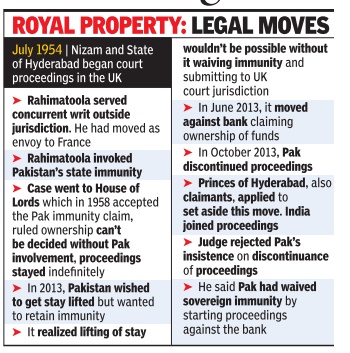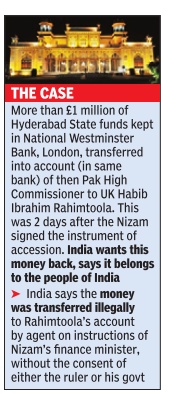Hyderabad Funds
| Line 33: | Line 33: | ||
In January, 2015, the UK court set aside Pakistan's plea to discontinue proceedings, and joined all interested parties, including India and the Nizam's grandsons. The court seems to have held Pakistan's actions unreasonable and ordered it to pay the legal costs incurred by the bank, India and the two grandsons who had opposed the Pakistani plea to discontinue proceedings. Interpreting the decision, a leading UK legal firm BrownRudnick emphasized that sovereign states must take great care not to take steps that can constitute a waiver of their sovereign immunity from jurisdiction. | In January, 2015, the UK court set aside Pakistan's plea to discontinue proceedings, and joined all interested parties, including India and the Nizam's grandsons. The court seems to have held Pakistan's actions unreasonable and ordered it to pay the legal costs incurred by the bank, India and the two grandsons who had opposed the Pakistani plea to discontinue proceedings. Interpreting the decision, a leading UK legal firm BrownRudnick emphasized that sovereign states must take great care not to take steps that can constitute a waiver of their sovereign immunity from jurisdiction. | ||
| + | |||
| + | =1954-2013: a history of the case= | ||
| + | [[File: royal property.jpg|Graphic curtesy: [http://epaperbeta.timesofindia.com//Gallery.aspx?id=19_03_2015_015_006_002&type=P&artUrl=Indias-chances-to-recover-Nizams-funds-brighten-19032015015006&eid=31808 ''The Times of India'']|frame|500px]] | ||
Revision as of 16:35, 30 March 2015
This is a collection of articles archived for the excellence of their content. |
2015: London HC ruling
Mar 19 2015
Sachin Parashar
Court opens door for India to regain Hyd funds from Pak
The 67-year-old Indo-Pak Hyderabad Funds saga has taken another turn with London's High Court of Justice ruling that Pakistan no longer has sovereign immunity over the State of Hyderabad's wealth. All these years, India was forced to deal with Pakistan bilaterally on recovery of the funds because in 1957 Islamabad invoked its right to sovereign immunity from court proceedings in Britain.
Hyderabad Funds refers to the over £1 million (£1,007,940 and 9 shillings) transferred from the erstwhile State of Hyderabad's bank account in London's National Westminster Bank to the account of the then Pakistan High Commissioner to UK, Habib Ibrahim Rahimtoola, on September 20, 1948.This was two days after the Nizam decided to accede to India. The money is now valued at around £35 million (rough ly Rs 322 crore) and has three claimants -Pakistan, India and the Nizam's family . As the successor state to Nizam's Hyderabad, India claims the Hyderabad Funds. Faced with no prospect of recovering it through the courts, the Indian Cabinet has been authorizing the government since the 1960s to pursue efforts for an out-of-court settlement with Pakistan and the Nizam's heirs.
In 2013, Islamabad decided to claim the funds and reopened legal proceedings. The court ruled that if Pakistan subjected itself to the UK court's jurisdiction it stood to lose its state immunity .
With this, India's chances of a recovery through the legal route brightened. India insists the funds belonged to the Nizam's state, not part of his private assets. The transfer to Rahimtoola was on instructions of the Nizam's finance minister, probably an authorized signatory to the account. He did it without the Nizam's consent. “These instructions were irregular.The finance minister had no power to withdraw the money without the Nizam's express sanction or that of his government. The ruler's instructions to retransfer the funds weren't complied with,“ the government had said earlier. The recent British court ruling means the dispute over the ownership of funds can be decided through the legal route, Islamabad having lost the right to block proceedings.
In January, 2015, the UK court set aside Pakistan's plea to discontinue proceedings, and joined all interested parties, including India and the Nizam's grandsons. The court seems to have held Pakistan's actions unreasonable and ordered it to pay the legal costs incurred by the bank, India and the two grandsons who had opposed the Pakistani plea to discontinue proceedings. Interpreting the decision, a leading UK legal firm BrownRudnick emphasized that sovereign states must take great care not to take steps that can constitute a waiver of their sovereign immunity from jurisdiction.
1954-2013: a history of the case

